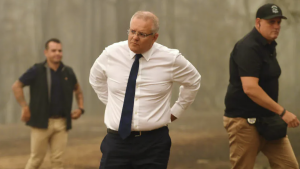Home » Commentary » Opinion » We don’t need a bushfire royal commission. We need clearly defined responsibilities
· Spectator

 Among the many extraordinary aspects of this season’s bushfire crisis is the blame directed towards the federal government – and the Prime Minister personally – for inadequate preparation and responses. Probably never before has a federal government been taken to task to such an extent for alleged mismanagement of a natural disaster.
Among the many extraordinary aspects of this season’s bushfire crisis is the blame directed towards the federal government – and the Prime Minister personally – for inadequate preparation and responses. Probably never before has a federal government been taken to task to such an extent for alleged mismanagement of a natural disaster.
Public opinion has taken this turn for various reasons, only starting with the optics of that Hawaiian holiday. There is a sizeable part of the population that has lived in dismay at the 2019 federal election result, and the more activist among them have seized on the first big opportunity since then to make Morrison squirm over something – and what better than bushfires that have an arguable link to climate change?
But there is a deeper reason, which is that many people have completely lost touch with what a federal system of government means, and now think the federal government is responsible for everything that matters to us and everything that goes wrong.
The irony is that the behaviour of federal governments of all colours going back decades has contributed to this mindset – federal governments that have willingly presided over the creeping expansion of their effective powers. This centralist creep has gone so far that the population has been conditioned to think there is only one level of government that counts, and it should be held to account for everything.
In that sense, if the current federal government feels under pressure over the bushfires, it is reaping the consequences of what it and previous federal governments have sewn over many years.
We have often heard it said – and it has been said in the context of the current bushfires – that people don’t care which level of government deals with an issue that concerns them, as long as it is dealt with by someone. Ordinary people are not interested in constitutional neatness.
That may or may not be the case; but even if true, it is not a good organising principle for a federal system of government. It is an attitude that has led to the overlap, duplication, blame game and confusion of accountability that wracks Australian federalism.
For a better operating principle, try this: every function of government should be assigned to the lowest level of government that can effectively carry it out, and the federal government should only be involved where it can add value. This is the subsidiarity principle of federalism, and it has been trashed time and again in the drift to more centralised government and is being trashed now in the controversy over the bushfires.
The constitutional assignment of powers and responsibilities exists for good reason. Accountability is lost if roles and responsibilities are all over the place. States have the responsibility and resources for fighting fires, but are getting an easy ride from public opinion because it is the federal government that is being held to account and hounded into doing more.
Nobody would suggest the federal government should play no part in responding to a natural disaster of the current spread and severity. But its role is fundamentally to support in ways it can — rather than to lead the effort.
The Commonwealth has no personnel or equipment of its own for fighting fires. The states are well set up for that. Nor is the Commonwealth responsible for resources and land management — matters assigned to the states and jealously guarded by them. The defence forces can provide logistical support, but the initiative for their use should come from the state authorities, which have the best information on how federal resources can be integrated with the states’ own efforts. If the states do not request defence force support, it is for them to explain why, not for the Commonwealth to barge in as it did recently in calling out reservists without full consultation with the states.
The federal government is often drawn into state areas of responsibility because it has the money. There is a long-standing federal-state cost-sharing agreement covering natural disaster recovery. But money alone is not a reason for the Commonwealth to take over. Emergency services — including rural fire services — are built into state budgets, and although the states do not have as much financial flexibility as the Commonwealth, they are not exactly financial cripples unable to make adjustments in response to particular natural disasters. New South Wales and Victoria between them control budgets of more than $150 billion.
There is no need for yet another royal commission. When this crisis is over, the Prime Minister and Premiers need to sit down as COAG and sort out what needs to be done differently in the future, having regard to the constitutional assignment of responsibilities and the many bushfire inquiries and royal commissions of the past.
We don’t need a bushfire royal commission. We need clearly defined responsibilities